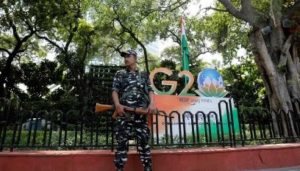
During the now-concluded G20 summit, the India-China standoff was transported from their de-facto boundary in northernmost India to New Delhi, right at the center of power of the world’s largest democracy.
While the Chinese leader Xi Jinping’s absence from resoundingly successful summit of the world’s wealthiest nations turned from an apparent snub to a shallow self-goal, it’s the Chinese delegation which travelled to New Delhi with Premier Li Qiang which had to be reportedly confronted by their Indian hosts at a hotel in the Indian capital.
According to a report in the Times of India, a day before the official beginning of the summit – on September 8 – a tense drama unfolded at the Taj Palace hotel in New Delhi where the unusual dimensions of the bags of a Chinese team member caught the attention of security officers at the hotel.
The Chinese side reportedly attempted to pass it off as ‘diplomatic baggage’. The Indian security personnel allowed the bags in given the diplomatic protocol, the Times of India report adds.
India-China hotel standoff: The mysterious Chinese suitcases
The report adds that a staff member, after a routine visit to the room where the delegation member was staying, reported some “suspicious equipment” in the bags, following which the Chinese team was told to put the bags through security scanner.
This was then followed by a tense standoff.
The Chinese side did not agree to let their bags checked and put them through the scanner.
What was the content in Chinese suitcases?
The report further adds that the Chinese side had sought a “private” internet connection which the hotel declined. This unusual request had already intrigued the security personnel deployed there.
But after the Chinese side did not let their unusually big suitcases be checked by the security personnel, a three-member security team was deployed to stand guard outside the room for nearly 12 hours.
As the Indian side persisted with their request to have the Chinese bags checked, a Chinese security official reportedly said that they would have the suitcase sent to the embassy at the Chinese embassy in Chanakyapuri.
Such equipment, the Times of India report adds while citing top Indian officials, could be “surveillance set up” generally used to intercept or jam secure communication channels. But no confirmation about the contents in the bags could be made because the Indian side did not get a chance to review the contents inside it.
India-China ties at G20
The frosty ties between India and China, amid a confrontational standoff between the forces of the two sides near the de-facto boundary in Ladakh, were evident after Chinese leader Xi Jinping’s absence at the summit. Xi, unlike his Russian counterpart Vladimir Putin – who also did not attend the summit – did not even show the courtesy to dial Narendra Modi to denote his absence from the summit.
But Xi’s absence, far from being a snub as sections of western media reported prior to the summit, added to New Delhi’s clout at G20 following a unanimously adopted Delhi declaration of G20 leaders on the first day of summit itself.




 Driving Naari Programme launched in Chandigarh
Driving Naari Programme launched in Chandigarh






























